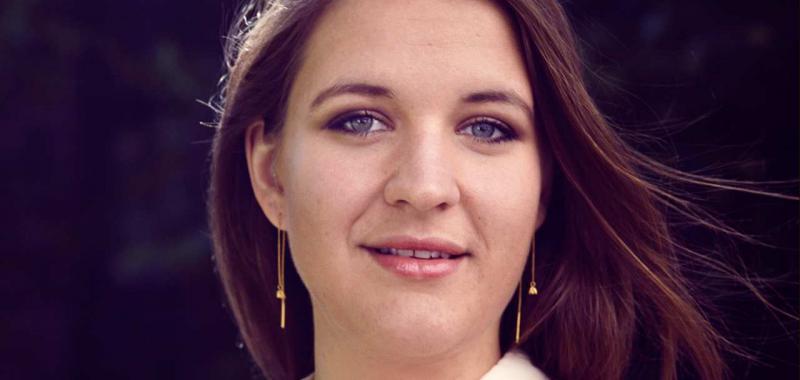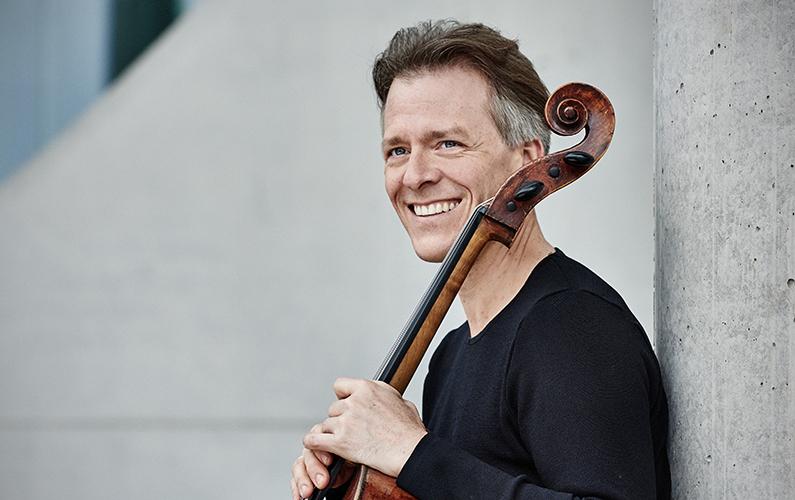Prom 33 review: Davidsen, Gerhardt, BBC Philharmonic, Storgårds - Nordic music glowing with colour | reviews, news & interviews
Prom 33 review: Davidsen, Gerhardt, BBC Philharmonic, Storgårds - Nordic music glowing with colour
Prom 33 review: Davidsen, Gerhardt, BBC Philharmonic, Storgårds - Nordic music glowing with colour
A thoughtful mixed programme from one of the BBC's most exciting conductors

Goodness the BBC Philharmonic plays well for John Storgårds. The orchestra’s chief guest conductor has a lovely easy manner on the podium – all curved gestures and loose arms, and the result is a partnership that brings the absolute best out of the BBC’s Manchester-based orchestra.
It was the solo viola that set the tone, thrusting its way through the orchestra at the start of their sequence of excerpts from Peer Gynt for a rough-hewn folk tune. The spirit of this ebullient dance, amplified across the entire orchestra, was joyous, light-footed, swaying gently even through the more meditative passages. Solo woodwind added their sheen to “Morning Mood”, but it was soprano Lise Davidsen – making her Proms debut – who caught the dome of the hall and set it ringing as soloist in “Solveig’s Song”.
This is a voice with huge peaks, but much more than blandly big
Davidsen’s is an iceberg of a voice; as yet we’re only seeing a hint of what this thrilling singer has in reserve. Still very young though, her nerves are as yet audible, and it took a while for intonation and tone to settle here. But once they did, Luonnoatar – Sibelius’s glorious creation-myth for soprano and orchestra – had new passion and assurance. This is a voice with huge peaks, but the delicate shading of the valleys – the low register, the pianissimo upper reaches – is equally striking, showing the grain of a voice that is much more than blandly big.
If Peer Gynt belonged to the woodwind, then the Karelia Suite was all about the brass – refined and gleaming, warming the texture pleasantly in the “Alla Marcia”. It was warmth that persisted through the Schumann Cello Concerto – a softly golden foil to the more silvery, tenorial tone of soloist Alban Gerhadt (pictured below right). Not one to round the work’s musical corners, Gerhardt gave us an opening movement that emphasised the disjunction, the angularity, rather than the through-line. The effect of these jagged edges melting in the slow movement was beautifully managed, and the quiet kinship of the duet between soloist and orchestral cello devastating. This was an interior sort of performance for an interior sort of concerto, mulling obsessively over themes, and only at the final second feeling able to fling wide its arms and invite us in.
 According to David Gutman’s note on Proms history, Hindemith’s Mathis der Maler Symphony has only received seven performances through the festival’s history. It’s a situation that mirrors the fate of Hindemith more generally (and the opera itself, more specifically), but doesn’t seem any the less sad, especially when you hear an account like this that pierces the dense textures and heavy swathes of development, and finds the beauty and delicacy at the heart of this work.
According to David Gutman’s note on Proms history, Hindemith’s Mathis der Maler Symphony has only received seven performances through the festival’s history. It’s a situation that mirrors the fate of Hindemith more generally (and the opera itself, more specifically), but doesn’t seem any the less sad, especially when you hear an account like this that pierces the dense textures and heavy swathes of development, and finds the beauty and delicacy at the heart of this work.
Inspired by the Isenheim Altarpiece, the symphony shares its chiaroscuro colouring, its contrasts. The Angel Concert here balanced radiance with an earthiness, a sense of being anchored in the world of man, even while gazing beyond. But it was the final movement that saw Storgårds and his orchestra in full spate, pouring out the magnificent fugue with a force and assurance that would convince even the staunchest unbeliever of the inevitability of deliverance and resurrection.
rating
Share this article
Add comment
The future of Arts Journalism
You can stop theartsdesk.com closing!
We urgently need financing to survive. Our fundraising drive has thus far raised £49,000 but we need to reach £100,000 or we will be forced to close. Please contribute here: https://gofund.me/c3f6033d
And if you can forward this information to anyone who might assist, we’d be grateful.

Subscribe to theartsdesk.com
Thank you for continuing to read our work on theartsdesk.com. For unlimited access to every article in its entirety, including our archive of more than 15,000 pieces, we're asking for £5 per month or £40 per year. We feel it's a very good deal, and hope you do too.
To take a subscription now simply click here.
And if you're looking for that extra gift for a friend or family member, why not treat them to a theartsdesk.com gift subscription?
more Classical music
 Robin Holloway: Music's Odyssey review - lessons in composition
Broad and idiosyncratic survey of classical music is insightful but slightly indigestible
Robin Holloway: Music's Odyssey review - lessons in composition
Broad and idiosyncratic survey of classical music is insightful but slightly indigestible
 Classical CDs: Wolf-pelts, clowns and social realism
British ballet scores, 19th century cello works and contemporary piano etudes
Classical CDs: Wolf-pelts, clowns and social realism
British ballet scores, 19th century cello works and contemporary piano etudes
 Bizet in 150th anniversary year: rich and rare French offerings from Palazzetto Bru Zane
Specialists in French romantic music unveil a treasure trove both live and on disc
Bizet in 150th anniversary year: rich and rare French offerings from Palazzetto Bru Zane
Specialists in French romantic music unveil a treasure trove both live and on disc
 Scottish Chamber Orchestra, Ibragimova, Queen’s Hall, Edinburgh review - rarities, novelties and drumrolls
A pity the SCO didn't pick a better showcase for a shining guest artist
Scottish Chamber Orchestra, Ibragimova, Queen’s Hall, Edinburgh review - rarities, novelties and drumrolls
A pity the SCO didn't pick a better showcase for a shining guest artist
 Kilsby, Parkes, Sinfonia of London, Wilson, Barbican review - string things zing and sing in expert hands
British masterpieces for strings plus other-worldly tenor and horn - and a muscular rarity
Kilsby, Parkes, Sinfonia of London, Wilson, Barbican review - string things zing and sing in expert hands
British masterpieces for strings plus other-worldly tenor and horn - and a muscular rarity
 From Historical to Hip-Hop, Classically Black Music Festival, Kings Place review - a cluster of impressive stars for the future
From quasi-Mozartian elegance to the gritty humour of a kitchen inspection
From Historical to Hip-Hop, Classically Black Music Festival, Kings Place review - a cluster of impressive stars for the future
From quasi-Mozartian elegance to the gritty humour of a kitchen inspection
 Shibe, LSO, Adès, Barbican review - gaudy and glorious new music alongside serene Sibelius
Adès’s passion makes persuasive case for the music he loves, both new and old
Shibe, LSO, Adès, Barbican review - gaudy and glorious new music alongside serene Sibelius
Adès’s passion makes persuasive case for the music he loves, both new and old
 Anja Mittermüller, Richard Fu, Wigmore Hall review - a glorious hall debut
The Austrian mezzo shines - at the age of 22
Anja Mittermüller, Richard Fu, Wigmore Hall review - a glorious hall debut
The Austrian mezzo shines - at the age of 22
 First Person: clarinettist Oliver Pashley on the new horizons of The Hermes Experiment's latest album
Compositions by members of this unusual quartet feature for the first time
First Person: clarinettist Oliver Pashley on the new horizons of The Hermes Experiment's latest album
Compositions by members of this unusual quartet feature for the first time
 Gesualdo Passione, Les Arts Florissants, Amala Dior Company, Barbican review - inspired collaboration excavates the music's humanity
At times it was like watching an anarchic religious procession
Gesualdo Passione, Les Arts Florissants, Amala Dior Company, Barbican review - inspired collaboration excavates the music's humanity
At times it was like watching an anarchic religious procession
 Classical CDs: Camels, concrete and cabaret
An influential American composer's 90th birthday box, plus British piano concertos and a father-and-son duo
Classical CDs: Camels, concrete and cabaret
An influential American composer's 90th birthday box, plus British piano concertos and a father-and-son duo
 Cockerham, Manchester Camerata, Sheen, Martin Harris Centre, Manchester review - re-enacting the dawn of modernism
Two UK premieres added to three miniatures from a seminal event of January 1914
Cockerham, Manchester Camerata, Sheen, Martin Harris Centre, Manchester review - re-enacting the dawn of modernism
Two UK premieres added to three miniatures from a seminal event of January 1914

Comments
Any chance you think that the